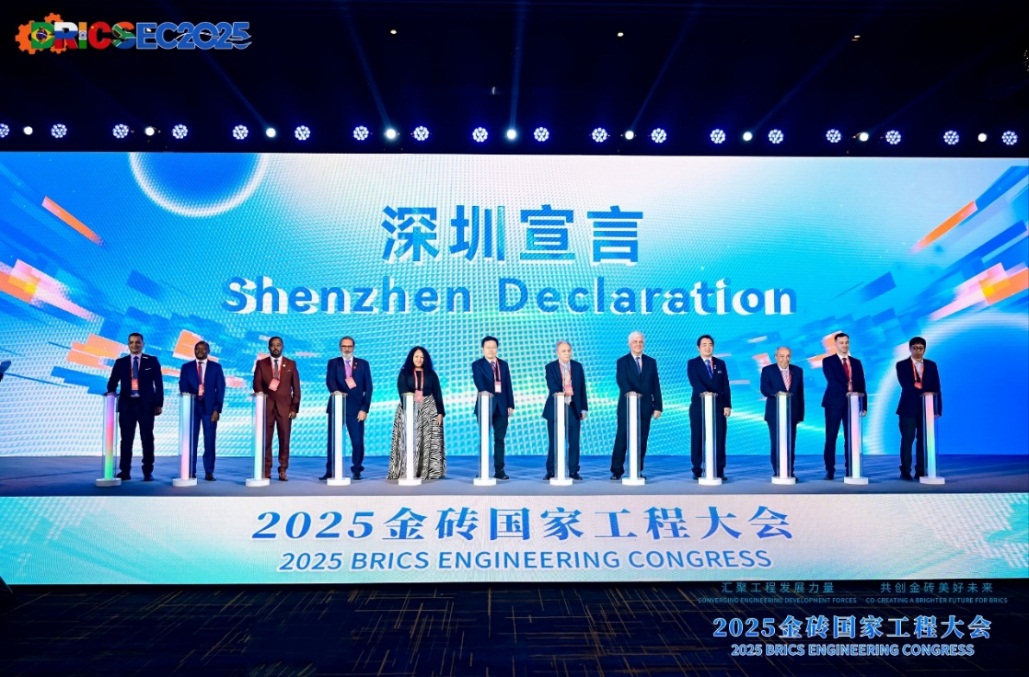2025 BRICS Engineering Congress -- a key platform for new paradigm of technological cooperation: attendees

Photo: Courtesy of 2025 BRICS Engineering Congress organizer
The 2025 BRICS Engineering Congress is a pivotal platform for establishing a new paradigm of technological cooperation, Alexander Sergeevich Antonov, Associate Professor in the Department of Materials Science and Resource-Saving Technologies at Yanka Kupala Grodno State University in Belarus, told the Global Times during the three-day event held in Shenzhen, Guangdong Province, from Thursday to Saturday.
Guided by the Chinese Society of Engineers (CSE) and hosted by the Harbin Institute of Technology, the Guangdong Association for Science and Technology, and the Heilongjiang Association for Science and Technology, the congress aims to accelerate the formation of the Federation of Engineering Institutions of BRICS. It seeks to promote practical cooperation in the engineering sector among BRICS nations, positioning BRICS as a significant channel for fostering unity and collaboration within the Global South and as a pioneering force for global governance reform.
Cooperation begins with the exchange of best practices, with a focus on engineering education and its quality across the scientific, educational, and production sectors in BRICS countries. The congress provides a platform for comparing engineering education models from various countries and technological sectors, enabling the development of proposals for national economic advancement, stated Olga Nikolaevna Kuzina, Vice-Rector for International Cooperation, Continuing Professional Education, and Personnel Policy at the National Research Moscow State University of Civil Engineering in Russia.
Regarding the establishment of the Federation of Engineering Institutions of BRICS, Kuzina emphasized that the primary task is to formulate a development strategy that considers the interests of participants and the engineering organizations, categorized by the maturity levels of each technological direction in the interacting BRICS countries. Another complex challenge involves creating a legal and regulatory framework for collaboration, particularly concerning intellectual property protection.
Experts and academics from BRICS and partner countries attending the congress underscored the significance of multilateral cooperation mechanisms for advancing engineering organizations’ cooperation within the BRICS framework. They expressed optimism about enhancing collaboration with China and believed that the BRICS platform can play a crucial role in addressing global challenges and promoting sustainable development.
Antonov highlighted that multilateral cooperation mechanisms are vital for the development of engineering sector, especially mechanical engineering, in BRICS nations, as they can help mitigate technological disparities, reduce reliance on Western supply chains, accelerate research and development through collaboration, and cultivate a new generation of engineering professionals.
Mechanical engineering is a high-tech, capital-intensive industry that necessitates investment in both research and development and production capabilities. Cooperation in this field can facilitate the pooling of financial resources, sharing of intellectual solutions, risk mitigation, and utilization of advanced production capacities. However, challenges remain in leveraging the results of joint intellectual endeavors, necessitating legal solutions across the various interacting countries, Kuzina noted.
Grigory Valentinovich Petrishin, Vice-Rector for Academic Affairs at the Sukhoi State Technical University of Gomel in Belarus, pointed out numerous areas for collaboration between China and Belarus, including new polymers, ceramics, metal materials, energy, nanotechnology, pharmacology, and mechanical engineering – fields where both nations possess significant expertise.
“I would like to emphasize a particularly promising area of interaction: machine tool building. Belarus has a well-established tradition in precision engineering, developing and producing various high-precision metal-cutting machines. Meanwhile, China has made significant strides in producing numerical control systems for machine tools. Cooperation in this domain will enable us to create competitive production of modern technological equipment,” Petrishin noted.
Kuzina believes that fostering engineering and technology exchanges between China and Russia will unlock numerous opportunities for mutually beneficial collaboration. Considering global trends and the construction industry's development strategy, the greatest synergistic effects can be achieved in industrial automation and robotics, additive technologies, the creation of new building materials and structures, digital economy development, urban planning approaches, and joint educational programs for assessing engineers, Kuzina said.
The future of engineering cooperation between BRICS and other countries hinges on increased technological exchange, addressing global challenges (such as climate change, space exploration, and ecological issues), developing joint research initiatives, digitalization, infrastructure development, and training a new generation of specialists. This collaboration could become a key driver of sustainable development and technological advancement, Kuzina said.
Source: https://www.globaltimes.cn/page/202504/1332949.shtml
